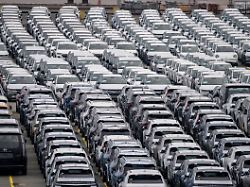Costs for the tax authorities: 50 billion
Transport transition brings with it massive tax losses
March 27, 2024, 4:33 p.m
Listen to article
This audio version was artificially generated. More info | Send feedback
A study by the management consultancy EY quantifies the losses that the state expects from switching to electric cars. Accordingly, the transport transition will cost the tax authorities almost 50 billion euros by 2030.
The switch to electric cars could cost the federal government almost 50 billion euros in tax money by 2030 – despite the cancellation of the electric car bonus. The management consultancy EY calculated this in a study available to Spiegel.
The majority of this, around 36 billion euros, could be lost to the tax authorities because the expected shortfall in tax revenue from the mineral oil tax cannot be nearly compensated for by additional revenue from the electricity tax. The federal government also supports company cars with electric motors. Two thirds of electric cars in Germany are registered to businesses. This also leads to reduced income.
EY estimates that the federal government could lose around 11.8 billion euros between 2024 and 2030 due to reduced income tax revenue. In their scenario, the consultants assume that around 13.2 million purely battery-powered cars and plug-in hybrids will be on German roads by 2030. There are currently 2.3 million.
“Almost 2 percent of the Federal Republic’s tax revenue has so far been generated at the gas station,” said Constantin Gall, Managing Partner at EY. Promoting electromobility makes sense for climate protection reasons. “However, the consequences in terms of tax revenue will be painful.”
Car expert: Mobility transition is taking a back seat
Meanwhile, car expert Ferdinand Dudenhöffer is also concerned about the development of Germany as a location for electric cars. “The auto industry has invested billions in the development of electromobility, but is now seeing that many plans and subsidies to expand it are being abandoned in Berlin politics,” Dudenhöffer recently told the Bavarian media group newspapers. “This means that the industry is in danger of losing its home market.”
“The German car manufacturers have developed electric vehicles with a lot of commitment in order to compete, but have been left alone by politicians on the home market,” Dudenhöffer continued. “The same applies to the EU. Germany and the EU are currently using all means to support Ukraine in the war against Russia. The mobility transition, which has been talked about so much, is being pushed into the background.”
